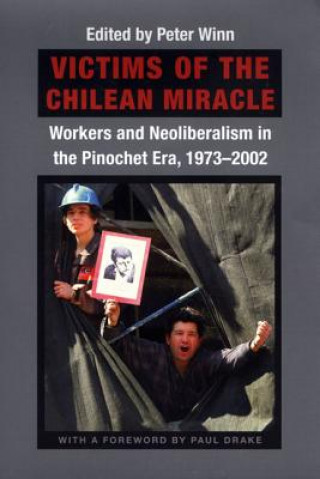
Dostawa
Doradca ds. zakupów
16 125 881 książek w 175 językach







Pokaż wszystkie języki (175)





Jednak się nie przyda? Nic nie szkodzi! U nas możesz zwrócić towar do 30 dni
 Bon prezentowy
O dowolnej wartości
Bon prezentowy
O dowolnej wartości
Bon prezentowy to zawsze dobry pomysł. Obdarowany może za bon prezentowy wybrać cokolwiek z naszej oferty.
Victims of the Chilean Miracle
 Angielski
Angielski
 90 b
90 b
30 dni na zwrot towaru
Mogłoby Cię także zainteresować


Chile was the first major Latin American nation to carry out a complete neo-liberal transformation. Its policies--encouraging foreign investment, privatizing public sector companies and services, lowering trade barriers, reducing the size of the state, and embracing the market as a regulator of both the economy and society--produced an economic boom that some have hailed as a "miracle" to be emulated by other Latin American countries. But how have Chile's millions of workers, whose hard labor and long hours have made the miracle possible, fared under this program? Through empirically grounded historical case studies, this volume examines the human underside of the Chilean economy over the past three decades, delineating the harsh inequities that persist in spite of growth, low inflation, and some decrease in poverty and unemployment. Implemented in the 1970s at the point of the bayonet and in the shadow of the torture chamber, the neoliberal policies of Augusto Pinochet's dictatorship reversed many of the gains in wages, benefits, and working conditions that Chile's workers had won during decades of struggle and triggered a severe economic crisis. Later refined and softened, Pinochet's neo-liberal model began, finally, to promote economic growth in the mid-1980s, and it was maintained by the center-left governments that followed the restoration of democracy in 1990. Yet, despite significant increases in worker productivity, real wages stagnated, the expected restoration of labor rights faltered, and gaps in income distribution continued to widen. To shed light on this history and these ongoing problems, the contributors look at industries long part of the Chilean economy--including textiles and copper--and industries that have expanded more recently--including fishing, forestry, and agriculture. They not only show how neoliberalism has affected Chile's labor force in general but also how it has damaged the environment and imposed special burdens on women. Painting a sobering picture of the two Chiles--one increasingly rich, the other still mired in poverty--these essays suggest that the Chilean miracle may not be as miraculous as it seems. Contributors: Paul Drake; Volker Frank; Thomas Klubock; Rachel Schurman; Joel Stillerman; Heidi Tinsman; Peter Winn
Informacje o książce
 Angielski
Angielski
Kategoria




 Jak kupować
Jak kupować




























